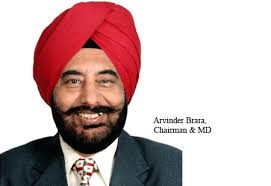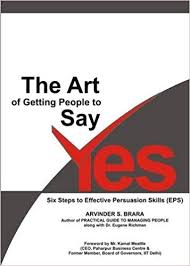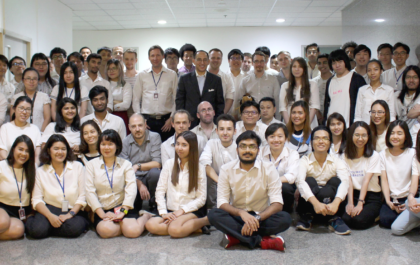
Peter Drucker, the father of modern management is one of Arvinder Singh Brara’s heroes.
But are concepts like Corporate Social Responsibility, Workforce Development and Organizational Culture relics of the past with no place in today’s rapidly changing work environment?
Is Management Theory irrelevant in the modern world?
Not at all, opines Mr. Brara, the Chairman of Mantec Consultants. Rather than being out of date, these principles, along with ideas like ethics, morals, hard work and fastidiousness, are timeless and needed today more than ever. And he has proven this time and again during his almost four decade career at the helm of his company, managing to steer Mantec towards steady growth using his people-centered approach and his strong focus on employee training and customer satisfaction. It may be time for businesses to fall back on these core principles instead of being obsessed with stock market based results. Maybe it’s time we focus on creating customer value, rather than squeezing the vitality out of a business simply to provide short term shareholder return.
Genup: Tell us about yourself.
AB: Well, my name is Arvinder Singh Brara and I’m an engineer with a degree from Punjab Engineering College and an MBA from one of the most beautiful places on earth, which is Honolulu, Hawaii. I went to the University of Hawaii on a grant by the East West Center, which means that everything was funded by the US government, including the fare for me, my wife and all the tuition. Before this, I was fortunate to be selected as a senior management trainee with the DCM group which one of the very well known groups around 1965. The other two groups were Hindustan Lever and the DCM group.
So the training had a very big impact on me because it covered all aspects of management. And then after my MBA, I was the only company that was selected by Xerox and one of the reasons I think was because I was wearing a turban, and I remember the name of the person, Lenny Ramos, who asked me why they should hire me since I looked so different. And i told him that it is precisely for that reason that they should hire me since it is a sales job and when I would walk into any American office, they would not be able to resist talking to me, they would be curious and then I would have the opportunity to sell their product. I was half joking but it came to be true, since I won various awards from Xerox. So while my major in university was marketing and corporate strategy, the real impact on my life, was the training after I was selected as a sales executive by Xerox. They had a training at Fort Lauderdale at the Sheraton Hotel for 2 weeks for about 200 people from all over the US and Canada to train us in what they called Professional Selling Skills and I learned a lot from that. Out of the 200 odd people, 6 were given the award for excellence and I was one of them. It was quite a surprise because I was a different looking person but my name was the first to be announced.
That training really changed my life.
Unfortunately such types of training are not there in industry and there should be. The training covered the entire gamut of the sales interaction. And I have now enlarged this –and I have written a book called “The art of getting people to say Yes” — to be used in day to day situations to get agreement or to get yes. It is a very powerful model. It has 6 steps. The first one is the initial benefit statement, how to start the conversation. Whether you are an entrepreneur or whether you have natural talent, but if you have this supplementary knowledge or expertise, it can help you to be much more effective. So I have found this to be one of the most useful things in my success and I feel that therefore as a way to give back to society, I also hold training programs for this and the driving force is that it will help people to improve. It is amazing how much people lack the skills to handle adversity. Everyone can handle it when the price is accepted and the delivery is suitable but when the customer says something like “no, don’t even talk about it”, or when your son or wife says a similar thing, people don’t know how to handle this. And the natural reaction is to try to convince by arguing and cajoling but that does not work. This is a skill that has to be learned and doesn’t come naturally. For example it is not natural for you to start a conversation with a statement that will benefit the other person. You would like to start with what you want from it, but the other person is really not interested in what you want. They are interested in what meets their requirement. So if you can judge what meets their requirement and this where Maslow’s hierarchy of needs helps. You have to first assess what is the need of the other person, whether it is a customer, a friend or a family member. So the initial benefit statement is very important. It is behavioral science, there are rules about what you must do in the initial benefit statement.
I have coined an acronym called OPOSPC.
O is Opening Statement: How to start the conversation
P is Probing: Understanding peoples’ needs
O is Objections Handling: Converting objection to acceptance
S is Supporting : Reassure and introduce situational benefits
P is Proving: How to prove and expand benefits
C is Closing : Getting the Acceptance
So these 6 steps are very important but unfortunately in the training given today people are only being trained on closing aspects and not all of these steps. So this has helped me to be very successful, I don’t know if it is very relevant but it may help to give an example:
You know, we do IT services from India for USA customers. In one situation, a customer did not renew our agreement and took away our business. And when we asked them the reason, they told us it is just routine, we usually invite more bids from other parties and while you did a good job but this time we’ve gone with somebody else. Had I not been trained by Xerox and their system, I would have given up. But I was trained to go into depth and understand. I wanted to have a meeting. But it was very hard to get the meeting and they discouraged us saying that it would be no use. Fortunately I had hosted that person’s boss’s secretary and I spoke to that lady. I told them that all we wanted to do was come and even though the job has been given to someone else, we wanted to share our experience with the new vendor so that they can do their job well for the customer. They can benefit. So finally that lady told him, Jeff was is name and convinced him to give us an appointment I flew from India to Pennsylvania. To cut the story short, after the meeting we got back the business. What had happened was that one of his subordinates was bad mouthing our integrity but when he met us he knew that we were genuine and qualified people. So he realized that he had been misled and eventually even became a good friend. So part of the success as an entrepreneur is the ability to deal with adverse situations, when everything seems to be lost. Just like a game of golf. If you hit a bad shot, it does not mean that everything is lost. You can make up for it. So life is like that. You will have ups and downs but the ability to bounce back is key. And that is helped by training and experience.

Genup: What was your initial spark? Why did you decide to do your own business instead of working for a corporation?
AB: That’s a good question. This goes back a long way when I was working for a consulting company. This was the time when computers were just being introduced. And i told my managing director that we should get into computers since it was a clear trend. But he was reluctant to do so, saying he couldn’t afford to do so. So once I realized that he would not branch out into what I was sure was a promising future, I decided to do it myself. Had he decided to do so, then maybe I may not have decided.
I started my consulting company called Mantec, and the interesting thing was that I never put money into the company. I mean I did put some for registration and for structuring the company but the first cheque from my client launched me. I didn’t need to put in any more money.
Genup: Did your family support you in your decision to become an entrepreneur?
AB: I remember my father in law saying that I was maybe making an unwise decision since with my job at the time, I had a pretty good salary, a car and driver and benefits etc. and this would be quite risky and there would be no security. But it turned out to be a good decision, and I ended up earning much more than I would have as an employee. My wife however has always fully supported me. But the rest of my family were not as convinced since I was giving up a very lucrative job. But I felt that I had to go with the times and it turned out to be a good decision.
Genup: Tell us about your business. What does Mantec do?
AB: Mantec has 4 divisions. We started with Executive Recruitment. So we do recruitment for international companies worldwide. Most of the clients are from India but we also have clients in the US and the UK. And then the other division is the Projects Division where we help do projects around the world. For instance one of the projects we did was in Thailand. We helped to put up a factory for Activated Clay. The third division is the Environment Division. You know all new projects these days need environmental clearance. You have to be able to make an environmental assessment report. And we are approved to do that and that requires an environmental lab, people in various disciplines in ecology, biodiversity, socio economic specialists and so on. We also do other jobs like for the World Bank and for the Asian Development Bank. And the fourth division is the IT division. We have a call center, a back office, we do photo shop processing mainly for US clients. In fact, we are the only company in the world probably that has all these diverse categories under one roof. Usually a company specializes in one of these. Not to say that we don’t specialize, since each of these divisions are separate, even physically separate. They are headed by separate profit center heads. It happens to be a unique concept.
Genup: How do you attract and retain customers?
AB: The basic thing in our business is the number of activities. Mantec is a member of the Indo American Chamber, the Confederation of Indian Industries, Consulting Engineers Association of India, and other organizations. So when we go to meetings and networking we get clients. We also do tenders from big companies and government organizations. The IT division also seeks out through contacts, identifying potential customers and pursuing them. So it is a mixture of activities.
Genup: What was the biggest hurdle you faced when you started?
AB: Well, to be honest, it has been pretty smooth sailing for the most part since I started. But maybe what I could have done better in hind sight is maybe hired better people. I’ve never hired A+ people, but then again maybe that strategy might have also worked for the simple reason that it is difficult to retain A+ people. Why would they stay with us rather than with the multinational consultancies out there. I’ve hired B+ people who can do their job but from not the very well known business schools. Basically people who are good but do not yet have a very marketable value. We do an initial test to see their intelligence and talent. We try to uncover hidden gems so to speak. But I guess I could have been more aggressive in hiring better quality people but then again who knows. Right now our retention is very high. We have people who have been working for us for over 30 years.
Genup: Is your business self funded? Do you have outside investors?
AB: No, I have not. Frankly I don’t believe in the model of getting outside investors because, you see, my ambition is not to be a multi billion dollar company. We are a multi million dollar company which is good enough for me. Actually one of the drawbacks and why companies fail is to be overly ambitious and to expand too rapidly. So our expansion growth is not dramatic, but steady and sustainable. So I’ve never believed in a partnership because you could have differences and you will find that sooner or later partnerships run into problems. I’m not saying the model of getting outside investors does not work but it works on different objectives. We grew profit retention and we own our own assets. Initially I took a loan for a building but I paid it back as quickly as I could.
Genup: Have you experienced failure and how did you bounce back?
AB: Well, we were once wrongfully black listed by the ministry of environment and forests. And that was a kind of a failure, and our competitors were very happy. The irony was that they black listed us on the grounds that for an environmental report we had made a report for 13 facilities whereas their terms of reference were for only 3 facilities. The bureaucrat who took this up high handedly did not see the clause below that stated that other facilities could also be included. So being black listed meant that we would never get further work. We subsequently took them to high court where we won the case. I remember the judge saying that this case was unique as someone was being punished for over performance. Anyway, you do come across high handed people in positions of authority and you need to be able to have the strength, confidence and belief and the ethical background to fight back.
Genup: How do you stay motivated? What drives you?
AB: What drives me really is a desire for excellence. Try to do better than what one has done in the past. And then you get a good reputation and praise from customers. So the driving force is to excel, have a good name and and to do better.
Genup: Who do you admire? Any books that have had a big impact on you?
AB: Yeah, Peter Drucker. I met him in California. I admire his books about the practice of management. He has been a good role model. He’s one person that I can think of who has really influenced me and I really try to follow his management principles.
Also motivational books like Napoleon Hill’s books, The 7 habits of highly effective people by Stephen Covey.
Genup: What don’t you like about being an entrepreneur?
AB: Well, there are hardly any things that I don’t like in life. I’m very adaptable. But if there is anything is that when you are faced with an ethical decision, like when the question of corruption comes up. I don’t like to encourage corruption, I don’t want to be a party to this. But as an entrepreneur in India, it is very difficult. I don’t like it and I have tried to overcome it and in many instances I have but really, that is something that I don’t like.

Genup: What does success in life mean to you?
AB: Success in life is contentment. When you are content with your level of earning or achievements. Because there is no limit to earning more and trying to be more successful. As long as you are thankful and you are reasonably comfortable. This is something from our Sikh Gurbani and the teachings there are very simple. Material pursuits can never give you happiness. This does not mean that you must not pursue material things. But you do it without their controlling you. You don’t become a slave to them. So I am very content and thankful for what we have.
Genup: What advice would you give someone considering the entrepreneurial path?
AB: Whatever one does, one should do things of high quality. Don’t compromise on that. It also pays to be ethical. Some people think it does not in the short term, but it does eventually. You should be truthful, ethical, emphasize on quality of what you deliver, and whatever you are expected to do for a client, you should exceed that.
Genup : Thank you very much.
AB: My pleasure !
Genup: Where can we go to learn more?
Related posts
Today's pick
Hot topics
Welcome to Generation Upstart
It starts with an idea — a fusion of thoughts and experiences, a blending of desires and dreams. Bursts of electricity fueled with faith, love and creativity leap across synapses generating the necessary expression to give it real form and substance. Sometimes, an entrepreneur’s call…
Careerlist: Never Waste a Crisis
According to Michael Scissons, the most important thing you can do to maximize your chance of entrepreneurial success is to build your tribe. Start as early as possible, trimming and pruning like a patient gardener, while continuing to add value to the network. For these…
RingZero: On Employee Satisfaction and Success
Great people make the great teams that make the great workplaces, and Mr. Asmat Yousri is a big believer in people. After all, he has been at this since 1996. An ex-banker, he saw no obstacles transitioning from a corporate position to an entrepreneur. In…



